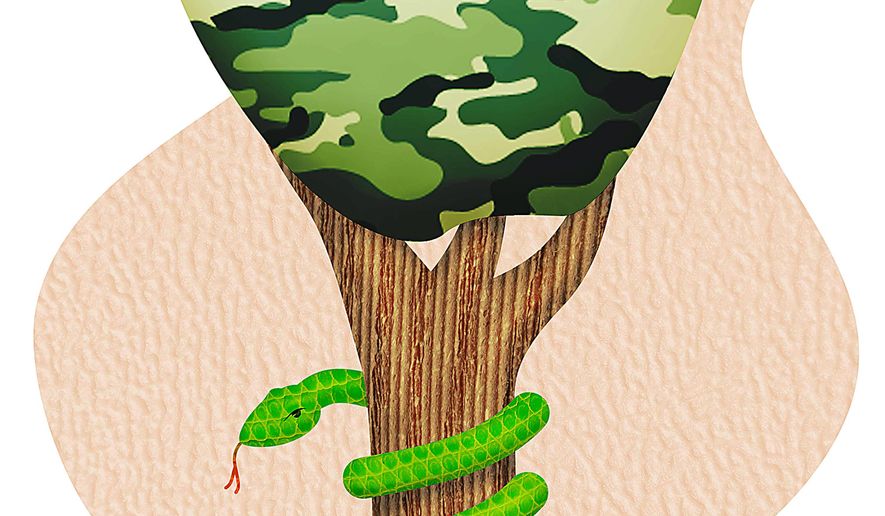OPINION:
Secretary of Defense Ash Carter announced last Thursday that all military occupations will open to women in 30 days. No exceptions. Our leaders appear to finally be decimating military inequality. As a former Army captain, though, I question the undisclosed details. While this policy change benefits a few individuals, the net impact to women will be negative if all aspects of the policy are indeed executed equally. The SECDEF mentioned past women-in-defense milestones in his press conference. However, those events, such as admission of women into service academies and opening of jet pilot positions, didn’t force women into action.
Regarding the Selective Service, two fair outcomes are possible. The first is that public outcry will result in abolishment of the Selective Service. The second is that women will be required to register. If women are ever drafted, I expect some men will insist that women share equally in high-mortality positions. It would, after all, only be fair.
Many remind us there’s not been a draft for 40 years. In 2001, my sister was appointed to West Point, I was a second lieutenant at Fort Bragg, and my brother was a third-year cadet at West Point. I remember consoling my concerned mother saying, “Mum, it’s not like there’s going to be another Vietnam.” Terrorists attacked our country within months. The following September, I deployed to Afghanistan. My parents spent seven years with at least one of us at war. While I am in no way comparing the Vietnam War to recent conflicts, I learned that national security can change in the blink of an eye.
As time passes and this new policy of equality unfolds, I predict fewer women will volunteer for military service. The military currently forces male commissioned officers into branches with unfilled vacancies. In 1999, some of my male West Point classmates were forced-branched as infantry officers. Male Army officers are also routinely involuntarily branch-detailed from their branch of choice into the infantry for a few years. Fairness mandates women also be subject to such practices. Proponents of this policy describe a sensitive Army corporation, concerned with individual ability. The force-branched and branch-detailed officers I know were not afforded the opportunity to refuse.
Many assume all women are in favor of the SECDEF’s policy changes. I disagree. Army women are well aware of the demands of formerly restricted jobs. While a handful of women are genuinely capable of functioning as infantry and armor soldiers, the Associated Press reported that of 30,000 Army women respondents to the Army’s 2013 survey, only about 7.5 percent were interested in closed-to-women jobs. I don’t fault ambitious, skilled women for wanting to serve in the same capacities as men. But, by those women gaining this option, all women will forfeit the right not to serve in those capacities, everything being strictly equal.
To avoid the problem of women filling jobs they can’t perform, some offer a solution of position-specific physical qualification tests. This solution is flawed. The military relies heavily on remediation training to meet manning requirements. In my support units, those unable to pass their physical fitness tests trained twice per day. Soldiers unable to make quota worked late. Such soldiers drained resources. If the military offers escape from demanding jobs, many soldiers will seize the opportunity to extricate themselves. Presently, challenged or dissatisfied soldiers generally can’t simply change jobs mid-enlistment. I wonder how many servicemen would’ve passed an infantry physical qualification test in 1970.
I hope the military plans to honestly educate young women recruits on the toll these newly opened jobs will exact. Women must know they are at greater risk for post-traumatic stress disorders. The American Psychological Association published research finding “Males experience more traumatic events on average than do females, yet females are more likely to meet diagnostic criteria for Posttraumatic Stress Disorder (PTSD), according to a review of 25 years of research …” Women must also be made aware of the high physical price. Israeli Defense Force Col. Raz Sagi claims that women in the IDF suffer injury disproportionally and alleges a massive cover-up by the Israeli Defense Force. According to research published in the Journal of Endocrinology, infertility may also be a life-altering disability of women subjected to unusually intense physical rigors. A person can’t fully appreciate the demands of infantry and armor until she’s functioned in those roles for an extended period.
What’s done is done. I truly hope this new policy strengthens our military. I hope women aren’t deterred from military service for fear of being forced into a job they can’t realistically perform. I hope the SECDEF, who never served in the military, knows better than his top military advisers. The last thing women need is to be forced into positions where they are subjected involuntarily to unequal risk and hardship for the sake of women’s equality.
• Julie Pulley is a former Army captain, an Afghanistan veteran and a graduate of West Point.




Please read our comment policy before commenting.